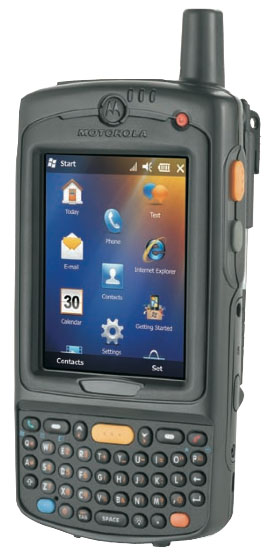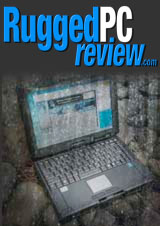The Motorola MC75A, introduced in March of 2010, is an update to the MC75 which became available in June of 2008 (and that was an update to the original and very successful MC70 Series Symbol had launched early 2006).  The MC75A is what Motorola calls an "Enterprise Digital Assistant" or EDA. The purpose of EDAs is "to enable enterprises to standardize on a single device for workers inside the four walls and out in the field."
The MC75A is what Motorola calls an "Enterprise Digital Assistant" or EDA. The purpose of EDAs is "to enable enterprises to standardize on a single device for workers inside the four walls and out in the field."
To that extent, the MC75A EDA is a very compact handheld (6 x 3.3 x 1.7 inches and weighing under a pound) that combines PDA functionality with mobile phone, wireless communication, and scanning into a single device designed to withstand the elements and a good deal of abuse: the MC75A is sealed to IP54 standards, can withstand five foot drops to concrete, and operate within a wide temperature range of 14 to 122 degrees Fahrenheit.
So what's new and improved with the MC75A? Physically, the device stays pretty much the same, but the technology has been beefed up significantly, and thanks to a switch to Windows Mobile 6.5, the interface looks all different.
What Microsoft tried with Winows Mobile 6.5 is provide a more modern look and feel that in many ways copies the Apple iPhone. Whereas older versions of Windows Mobile required a stylus (or fingernail) to operate, there is now much more of an emphasis on touch. This means larger menus that you can scroll, scrolling itself has that iPhone feel with acceleration and bounce when you hit the top or bottom of a list, soft key menus are much larger and the Today screen is totally new with a vertical slider menu that will look familiar to those who use the Microsoft Zune media player. The Start menu has been replaced with tappable icons, the browser has been overhauled, and everything looks a bit nicer. Underneath, however, things haven't changed nearly as much, and those used to the prior MC75 will find a combination of old and new.
On the technology side, a powerful 806MHz Marvell PXA320 processor has replaced the 624MHz PXA270, RAM has doubled to 256MB, Flash quadrupled to 1GB, and wireless functionality has been brought up to the latest standards. Bluetooth is now version 2.1 + EDR (Enhanced Data Rate), and WWAN has been brought up to 3.5G (either GSM HSDPA or CDMA-EVDO Rev. A). The available integrated camera now has 3.2 megapixel resolution instead of just 2 megapixel, and those opting for a 2D imager instead of the also available SE950 laser scanner now get the SE4500-SR engine that has higher resolution and enhanced features over the SE4400 engine available with the older MC75. And there's now also an integrated accelerometer.
The display remains a 3.5-inch diagonal transflective TFT with a glass analog resistive touch
screen with full 480 x 640 VGA resolution. The battery provides 3.7 Volts/3,600mAh, with an extended 3.7 V/4,800mAh battery available. Expandability is via a user accessible microSDHC slot that can accommodate cards with up to 32GB. Onboard connectivity includes USB 1.1, RS-232, speaker, microphone, and a headset jack. Ethernet is available via cradle.
For operation, the MC75 offers multiple QWERTY and numeric keypad options. Like its predecessors, the MC75A can be ordered with a wealth of peripherals, including trigger handle, vehicle and single slot cradles, belt clips, magnetic stripe reader attachment, numerous cables, and also multiple unit cradles and charger.
Like most recent vertical market handhelds, the MC75A comes with integrated GPS. This allows organisations with field-based employees, such as postal companies, to track and manage dynamic, real-time tasking, as well as verify specific locations of activities and provide mobile workers with pinpoint navigation support to improve location-based productivity.
Finally, Motorola stresses the MC75A's compatibility with its Motorola Mobility Suite and Mobility Services Platform that provides both centralized control and the ability to remotely stage, provision, monitor and troubleshoot devices no matter where they are.
Overall, this is a good upgrade to an already good device. The move to Windows Mobile 6.5 is a bit of a question mark as the iPhone and Android-based devices have increased the bar of user interface expectations forever, and Windows Mobile 6.5 cannot be seen as more than a stop-gap solution, especially since the WIndows Phone 7 is going off in a different direction.
Update: On March 29, 2011, Motorola Solutions announced an addition to the MC75A line. According to Moto, the MC75A HF RFID Contactless mobile computer leverages the MC70/MC75 form factor and accessories (installed base of more than one million units globally) with an HF RFID reader/writer for NFC (Near Field Communications) contactless communication, supporting MIFARE, FeliCa and Calypso (ISO 14443-A/B) and standard ISO15693 RFID tags.



